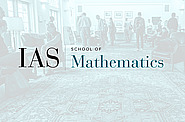CSDM Seminars
Feb
21
2011
Computer Science/Discrete Mathematics Seminar I
Information Cost Tradeoffs for AUGMENTED INDEX and Streaming Language Recognition
11:15am|S-101
Feb
15
2011
Computer Science/Discrete Mathematics Seminar II
Automatizability and Simple Stochastic Games
10:30am|S-101
Feb
14
2011
Computer Science/Discrete Mathematics Seminar I
An Elementary Proof of Anti-Concentration of Polynomials in Gaussian Variables
11:15am|S-101
Feb
08
2011
Computer Science/Discrete Mathematics Seminar II
Bypassing UGC From Some Optimal Geometric Inapproximability Results
Rishi Saket
10:30am|S-101
Feb
07
2011
Feb
01
2011
Computer Science/Discrete Mathematics Seminar II
On The Complexity of Computing Roots and Residuosity Over Finite Fields
10:30am|S-101
Jan
31
2011
Computer Science/Discrete Mathematics Seminar I
Sparsifying and Derandomizing the Johnson-Lindenstrauss Transform
11:15am|S-101
Jan
25
2011
Computer Science/Discrete Mathematics Seminar II
Learning with Boolean Threshold Functions, a Statistical Physics Perspective
R\'emi Monasson
10:30am|S-101
Jan
24
2011
Computer Science/Discrete Mathematics Seminar I
Universal One-Way Hash Functions via Inaccessible Entropy
Hoeteck Wee
11:15am|S-101
Jan
18
2011
Computer Science/Discrete Mathematics Seminar II
Efficiently Learning Mixtures of Gaussians
10:30am|S-101
